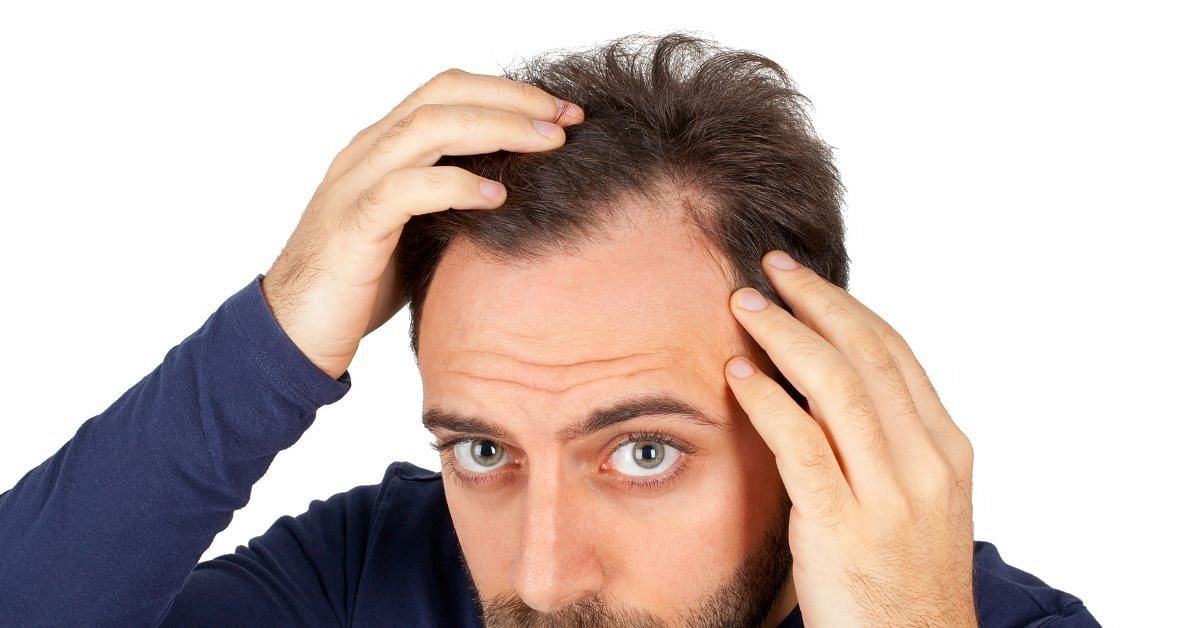Itching Scalp and Hair Loss: What is the Link? Causes & Treatment

Itchy scalp, also known as scalp pruritus, is a fairly common ailment. It can be caused by a variety of factors and be a symptom of a more serious medical condition.
Itching may be accompanied by flakiness, scaly patches, bumps, and even hair loss in some cases. Hair loss can occur if the scratching is excessive or if the scalp condition affects the structure or strength of the hair follicles. Hair usually regrows after the underlying scalp condition is treated.
People frequently experience both itchy scalp and hair loss, implying that these health issues may be related or that one may cause the other.
This article discusses common causes of scalp itching and hair loss, along with ways to treat and prevent these conditions.
What is the Link?
Although these conditions can occur independently, there may be an occasional link between hair loss and scalp itching.
Fungal infections, allergic reactions to hair products, and inflamed hair follicles can itch the scalp and cause hair loss.
Scar tissue on the scalp can damage the nerve fibres in the skin, causing severe itching in some cases. Scar tissue that has formed due to a person's hair loss may cause itching.
Scratching an itchy scalp repeatedly or intensely can cause skin and hair follicle damage. Scratching can result in temporary hair loss, bleeding, and scabbing. When a person stops scratching, his or her hair usually grows back.
In other cases, such as hereditary hair loss or male and female pattern hair loss, hair loss occurs without scalp itching. In these cases, scratching the scalp may cause damage, but the underlying cause of the hair loss is unrelated to the itchiness. Scratching does not affect whether a person's hair falls out due to hereditary hair loss.

Causes of an Itchy Scalp and Hair Loss
The following conditions and factors can cause both an itchy scalp and hair loss:
1. Scalp Ringworm
Ringworm is a fungal infection that causes an itchy, ring-shaped rash. Ringworm and other fungal infections can cause hair follicles to weaken, leading to hair loss.
Ringworm patients may have noticeable patches of hair loss on their scalp.
Prescription antifungal creams can be used to treat scalp ringworm, and hair will regrow after treatment.
2. Allergic Reactions
Ringworm is a fungal infection that causes an itchy, ring-shaped rash. Ringworm and other fungal infections can cause hair follicles to weaken, leading to hair loss.
Ringworm patients may have noticeable patches of hair loss on their scalp.
Prescription antifungal creams can treat scalp ringworm, and hair will regrow after treatment:
- shampoos
- conditioners
- hair dyes
- hair gels
- hair mousses
Many dark hair dyes contain the chemical paraphenylenediamine, which is a common cause of allergic scalp reactions.
Allergy creams or medications are frequently used to treat the itching. If a product causes an allergic reaction, the user should stop using it and try a different brand or product.

3. Folliculitis
Folliculitis is an infection that affects the hair follicles. Folliculitis is commonly caused by fungal and bacterial infections.
Itching and temporary hair loss are common infection symptoms.
Folliculitis can be treated with antibiotics or antifungal medications to alleviate itching.
4. Lichen Planopilaris
Lichen planopilaris is an inflammatory scalp condition. According to experts, lichen planopilaris is caused by a weakened immune system.
The condition can cause:
- itchiness
- scaly skin
- hair loss
5. Alopecia Areata
Alopecia areata is a condition that causes all or some of a person's hair to fall out. It can also cause itching on the scalp.
Although scientists are unsure of the exact cause of alopecia areata, they believe it is caused by a person's immune system mistakenly attacking hair follicles.
People with an autoimmune disorder or a family history of it are more likely to develop alopecia areata.
Common treatments for these conditions include:
- immunotherapy
- antifungal medications and ointments
- Steroids
People who suffer from hereditary hair loss may benefit from one of the following treatments:
- hair transplants
- minoxidil
- finasteride (Propecia)
- Atopic dermatitis
Atopic dermatitis is a type of eczema that is distinguished by a red rash and itching. Although atopic dermatitis does not cause hair loss directly, it can cause excessive scratching, which can result in temporary hair loss.
Creams and ointments can be used to treat atopic dermatitis. Treatment options can be discussed with a medical professional.

6. Psoriasis
Psoriasis is an autoimmune condition characterised by dry, red patches covered in silvery scales. Scales of psoriasis can appear on the scalp and are frequently itchy.
If a person scratches the psoriasis scabs on their scalp, the scabs will fall off, resulting in hair loss.
Psoriasis patients can work with their doctors to develop a treatment plan.
7. Dandruff
A dry, itchy scalp distinguishes dandruff. Skin flaking can be seen throughout the day and after scratching.
Dandruff can result in hair loss, but this is extremely uncommon. Dandruff usually only causes hair loss if it is ignored for an extended period of time and scratched excessively on the scalp.
Treatment options include over-the-counter (OTC) anti-dandruff shampoos, ointments, and creams. Before shampooing, apply natural oils to the scalp, such as coconut oil, to help exfoliate the scalp's dead skin and flakes.
Treatments for an Itchy Scalp With Hair Loss
Treatment options differ depending on the cause of the itching and hair loss. Your doctor may advise you:
- Reduce inflammation with steroids (taken orally, applied topically, or injected)
- Yeast-fighting antifungals (topically or orally)
- An immunotherapy medication that turns on or off the immune response
Common therapies to treat hair loss include:
- Slowing hair loss and regrowth with minoxidil (Rogaine)
- Treatment of inherited baldness with finasteride (Propecia)
- A hair transplant

Home Remedies to Deal Itchy Scalp and Hair Loss
Not every itchy scalp with hair loss necessitates medical attention. Here are some things you can do on your own to keep your scalp and hair healthy.
1. Eat a healthy diet
Important nutrients for hair and scalp health include:
- iron
- zinc
- niacin
- selenium
- vitamins A, D, and E
- biotin
- amino acids
- protein
One caveat: Avoid taking these nutrients as supplements unless you have a known deficiency. According to research published in Dermatology Practical and Conceptual, there is no good scientific evidence that these supplements prevent hair loss if you already have adequate amounts in your body. Furthermore, excessive supplementation can cause hair loss.
2. Use targeted shampoos
To combat yeast, use a shampoo containing selenium or zinc if you have dandruff.
3. Try essential oils
Despite a lack of scientific evidence, animal studies have shown that essential oils such as rosemary and peppermint can slow hair loss and promote new hair growth. Essential oils must be diluted with a carrier oil before being applied to the scalp.
Now is the time to experiment with diluted peppermint or rosemary oil.

4. Enjoy a scalp Massage
According to research published in Eplasty, scalp massage can increase hair thickness by increasing blood flow or stimulating hair cells.
5. Treat hair gently
To limit hair loss:
- Do not scratch excessively.
- Avoid wearing your hair in a tight ponytail and exposing your scalp and hair to high heat and styling products.
- Wash with a gentle shampoo and air dry until you determine what is causing your scalp itching and hair loss.
Prevention Against Itchy Scalp Hair Loss
The following are indications that you should seek medical attention for your itchy scalp and any subsequent hair loss::
- Itching so severe that it interferes with normal activities or disrupts sleep
- crusty scalp patches, bald patches, clumps of hair falling out, or sudden hair thinning
When to Contact a Doctor
A person should contact a healthcare professional if they experience any of the following:
- unexpected hair loss
- bald patches appear, and hair falls out in clumps
- severe scalp itching and burning, especially if the person is also experiencing hair loss
Individuals should contact a healthcare professional before using any hair loss or scalp treatment.
Summing Up on Itching Scalp and Hair Loss
When there is a link between an itchy scalp and hair loss, treating the underlying cause usually allows the hair to grow back over time.
Although people cannot always avoid hair loss and scalp itchiness, they can help prevent them by using gentle hair products, eating a nutrient-rich diet, and managing underlying health conditions.
References
SCALP PSORIASIS: DIAGNOSIS AND TREATMENT - https://www.aad.org/public/diseases/psoriasis/treatment/genitals/scalp-treatment#symptoms
Promotion of Hair Growth by Rosmarinus officinalis Leaf Extract - https://onlinelibrary.wiley.com/doi/abs/10.1002/ptr.4712
Lichen planopilaris - https://rarediseases.info.nih.gov/diseases/3247/lichen-planopilaris
HAIR LOSS: TIPS FOR MANAGING - https://www.aad.org/public/diseases/hair-loss/treatment/tips
Clinical Diagnosis of Common Scalp Disorders - https://www.jidsponline.org/article/S0022-202X(15)52585-2/fulltext

